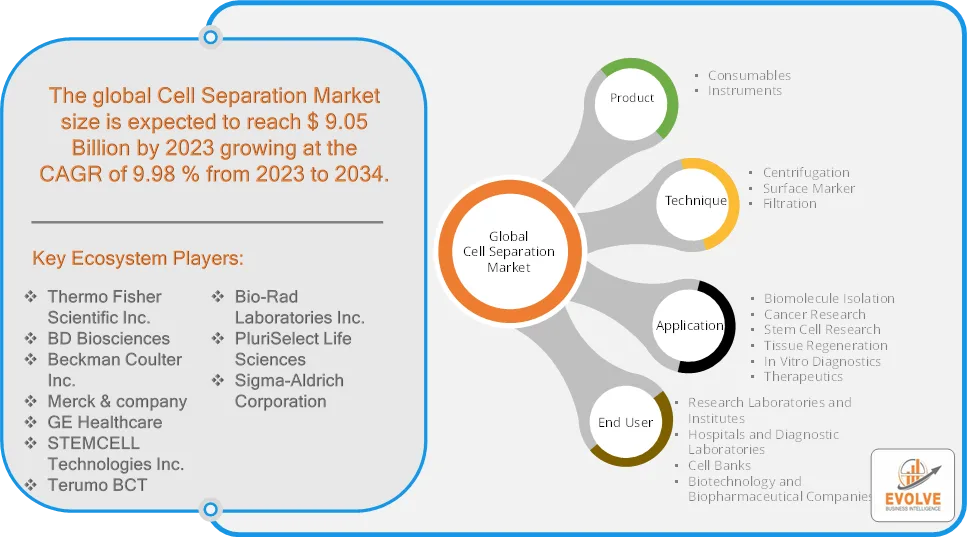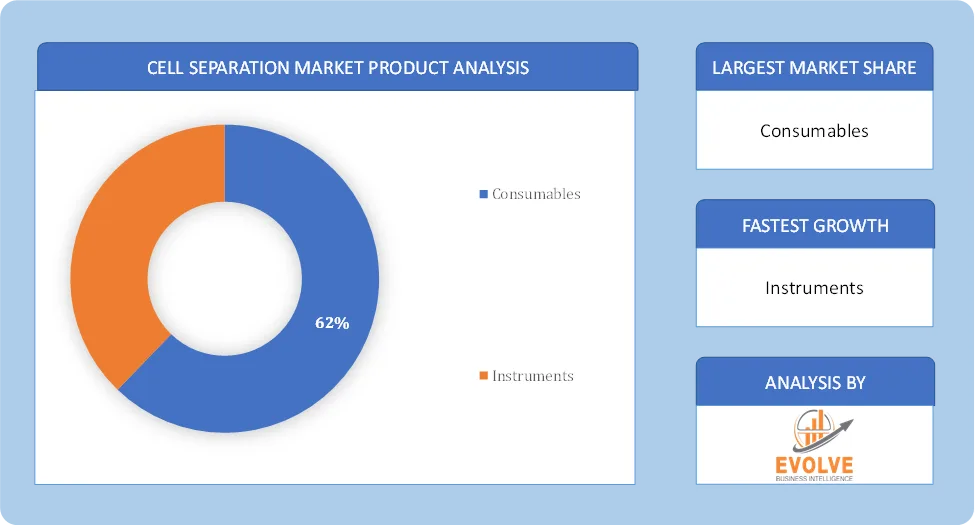Blog
The Cell Separation Market Is Estimated To Record a CAGR of Around 9.98% During The Forecast Period

Evolve Business Intelligence has published a research report on the Global Cell Separation Market, 2024–2034. The global Cell Separation Market is projected to exhibit a CAGR of around 9.98% during the forecast period of 2024 to 2034.
Evolve Business Intelligence has recognized the following companies as the key players in the global Cell Separation Market: Thermo Fisher Scientific Inc., BD Biosciences, Beckman Coulter Inc., Merck & company, GE Healthcare, STEMCELL Technologies Inc., Terumo BCT, Bio-Rad Laboratories Inc., PluriSelect Life Sciences and Sigma-Aldrich Corporation.
The Global Cell Separation Market is projected to be valued at USD 16.88 Billion by 2034, recording a CAGR of around 9.98% during the forecast period. The Cell Separation Market is a rapidly growing segment within the biotechnology and life sciences industry. It focuses on isolating specific cell populations from heterogeneous biological samples for various applications, including research, diagnostics, and therapeutics.
The cell separation market is poised for substantial growth, driven by ongoing technological advancements and the increasing demand for cell-based applications in research and medicine. Cell separation is crucial for isolating and characterizing stem cells, which are essential for regenerative therapies.
Download the full report now to discover market trends, opportunities, and strategies for success.
Segmental Analysis
The global Cell Separation Market has been segmented based on Product, Technique, Application and End User.
Based on Product, the Cell Separation Market is segmented into Consumables, Instruments. The Consumables is anticipated to dominate the market.
Based on Technique, the global Cell Separation Market has been divided into Centrifugation, Surface Marker, Filtration. The Centrifugation segment is anticipated to dominate the market.
Based on Application, the global Cell Separation Market has been divided into Biomolecule Isolation, Cancer Research, Stem Cell Research, Tissue Regeneration, In Vitro Diagnostics, Therapeutics. The Biomolecule Isolation segment is anticipated to dominate the market.
Based on End User, the global Cell Separation Market has been divided into Research Laboratories and Institutes, Hospitals and Diagnostic Laboratories, Cell Banks, Biotechnology and Biopharmaceutical Companies. The Research Laboratories and Institutes segment is anticipated to dominate the market.
Regional Analysis
The Cell Separation Market is divided into five regions: North America, Europe, Asia-Pacific, South America, and the Middle East, & Africa. North America holds a significant market share. This is largely due to its advanced healthcare infrastructure, substantial research funding, and the presence of numerous leading biotechnology and pharmaceutical companies. The United States plays a pivotal role, with extensive R&D activities in areas like cancer research, stem cell therapy, and personalized medicine. Europe also holds a significant portion of the market, driven by its well-established biotechnology industry and strong research institutions. Aging population and increasing prevalence of chronic diseases and has strong focus on personalized medicine. Asia-Pacific region is experiencing the fastest growth in the cell separation market and Factors like increasing healthcare expenditure, a growing patient population, and improving diagnostic and research infrastructure are driving this growth. Rising investments in cell-based research, particularly in countries like China, India, Japan, and South Korea. Latin America is witnessing increased investment in biotech R&D, particularly in Brazil, Mexico, and Argentina and Rising demand for cell-based therapies in cancer and infectious disease treatment. The MEA region is slowly expanding in the Cell Separation Market, with key growth areas in UAE, Saudi Arabia, and South Africa. Expanding healthcare infrastructure and biotech research funding in Gulf nations and Increasing focus on regenerative medicine and stem cell research in South Africa.




